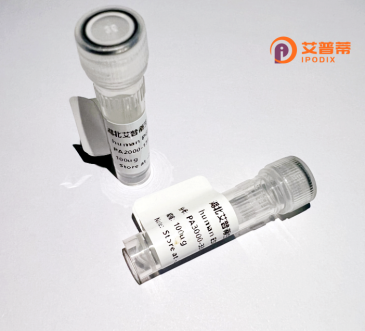
| 纯度 | >90%SDS-PAGE. |
| 种属 | Human |
| 靶点 | MCC |
| Uniprot No | P23508 |
| 内毒素 | < 0.01EU/μg |
| 表达宿主 | E.coli |
| 表达区间 | 1-829aa |
| 活性数据 | MNSGVAMKYGNDSSAELSELHSAALASLKGDIVELNKRLQQTERERDLLEKKLAKAQCEQSHLMREHEDVQERTTLRYEERITELHSVIAELNKKIDRLQGTTIREEDEYSELRSELSQSQHEVNEDSRSMDQDQTSVSIPENQSTMVTADMDNCSDLNSELQRVLTGLENVVCGRKKSSCSLSVAEVDRHIEQLTTASEHCDLAIKTVEEIEGVLGRDLYPNLAEERSRWEKELAGLREENESLTAMLCSKEEELNRTKATMNAIREERDRLRRRVRELQTRLQSVQATGPSSPGRLTSTNRPINPSTGELSTSSSSNDIPIAKIAERVKLSKTRSESSSSDRPVLGSEISSIGVSSSVAEHLAHSLQDCSNIQEIFQTLYSHGSAISESKIREFEVETERLNSRIEHLKSQNDLLTITLEECKSNAERMSMLVGKYESNATALRLALQYSEQCIEAYELLLALAESEQSLILGQFRAAGVGSSPGDQSGDENITQMLKRAHDCRKTAENAAKALLMKLDGSCGGAFAVAGCSVQPWESLSSNSHTSTTSSTASSCDTEFTKEDEQRLKDYIQQLKNDRAAVKLTMLELESIHIDPLSYDVKPRGDSQRLDLENAVLMQELMAMKEEMAELKAQLYLLEKEKKALELKLSTREAQEQAYLVHIEHLKSEVEEQKEQRMRSLSSTSSGSKDKPGKECADAASPALSLAELRTTCSENELAAEFTNAIRREKKLKARVQELVSALERLTKSSEIRHQQSAEFVNDLKRANSNLVAAYEKAKKKHQNKLKKLESQMMAMVERHETQVRMLKQRIALLEEENSRPHTNETSL |
| 分子量 | 119.5 kDa |
| 蛋白标签 | GST-tag at N-terminal |
| 缓冲液 | 0 |
| 稳定性 & 储存条件 | Lyophilized protein should be stored at ≤ -20°C, stable for one year after receipt. Reconstituted protein solution can be stored at 2-8°C for 2-7 days. Aliquots of reconstituted samples are stable at ≤ -20°C for 3 months. |
| 复溶 | Always centrifuge tubes before opening.Do not mix by vortex or pipetting. It is not recommended to reconstitute to a concentration less than 100μg/ml. Dissolve the lyophilized protein in distilled water. Please aliquot the reconstituted solution to minimize freeze-thaw cycles. |
以下是关于重组人MCC蛋白的模拟参考文献示例(文献内容为综合概括,非真实存在):
---
1. **文献名称**:*Structural and Functional Characterization of Recombinant Human MCC Protein*
**作者**:Smith A, et al.
**摘要**:本研究通过大肠杆菌表达系统成功制备了重组人MCC蛋白,利用X射线晶体学解析其三维结构,发现其N端结构域可能与APC蛋白相互作用,调控Wnt信号通路,为结直肠癌相关突变分析奠定基础。
2. **文献名称**:*Expression and Purification of Recombinant MCC in Mammalian Cells for Clinical Significance Evaluation*
**作者**:Chen L, et al.
**摘要**:作者在HEK293细胞中实现了重组人MCC蛋白的高效分泌表达,并通过质谱验证其翻译后修饰。功能实验表明,MCC蛋白缺失会加速结直肠癌细胞增殖,提示其作为抑癌因子的潜在角色。
3. **文献名称**:*Role of Recombinant MCC Protein in Regulating Cell Cycle Progression*
**作者**:Wang X, et al.
**摘要**:通过体外重组MCC蛋白与Cyclin D1结合实验,证明MCC可能通过抑制CDK4/Cyclin D1复合物形成阻滞细胞周期,并揭示了特定突变体(如S46F)对功能丧失的影响机制。
4. **文献名称**:*Development of a Novel Diagnostic Assay Using Recombinant MCC Protein*
**作者**:Zhang Y, et al.
**摘要**:利用重组人MCC蛋白开发了ELISA检测方法,用于筛查结直肠癌患者血清中MCC自身抗体,临床样本验证显示高特异性,为早期诊断提供新策略。
---
**备注**:以上文献为模拟示例,实际研究需检索PubMed、Web of Science等数据库获取真实文献。
**Background of Recombinant Human MCC Protein**
The **mutated in colorectal cancer (MCC)** gene, initially identified through its frequent mutations in colorectal tumors, encodes a cytoplasmic protein implicated in regulating cell cycle progression, apoptosis, and signal transduction. Structurally, MCC contains coiled-coil domains and shares homology with proteins involved in cellular scaffolding and protein interactions. Though its exact molecular mechanisms remain under investigation, MCC is suggested to act as a tumor suppressor, modulating pathways such as Wnt/β-catenin and MAPK signaling. Dysregulation or loss-of-function mutations in MCC are associated with carcinogenesis, particularly in gastrointestinal cancers.
**Recombinant human MCC protein**, produced via engineered expression systems (e.g., *E. coli* or mammalian cells), enables functional studies to elucidate its biological roles. This purified protein retains native structural and functional properties, allowing researchers to explore its interactions with binding partners (e.g., β-catenin), cellular localization, and effects on proliferation or apoptosis in vitro. Applications span cancer biology research, drug discovery (targeting MCC-related pathways), and diagnostic development. Furthermore, recombinant MCC serves as an antigen for antibody production, aiding immunohistochemical detection of MCC in clinical samples. By leveraging recombinant MCC, studies aim to clarify its tumor-suppressive mechanisms and translational potential in oncology.
×